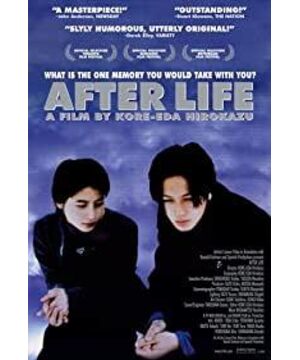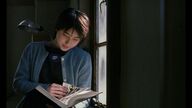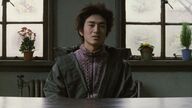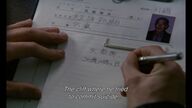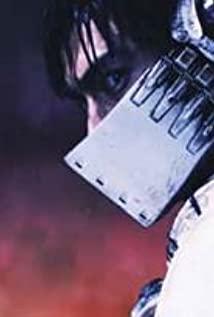"Next Station, Heaven", the English name is translated as "After life", the English name is more practical, the Japanese name "ワンダフルライフ" Google translation is "wonderful life", Youdao translation is "wonderful life", and Chinese movies The feeling of the name is still different.
I watched Ang Lee mention this movie before, thinking about the story after death as an Oriental, probably because he thought it was very interesting, and then he had a conversation with Hirokazu Koeda. I remembered the movie at the time.
The setting of the movie seems to me to have a very contrasting feeling. It uses a very realistic scene to tell a fantasy story about people after death. Those who died are just like in our daily life, some uncle, or grandma, or young people, if they don't tell you that they are dead, they will even think it is daily life. The staff told them to let them choose the memories they want to take away within three days, because other things will be forgotten and only this one can be taken away. Some people are selected very quickly, but there are changes later, and some people can't or don't want to be elected. This becomes a "troublesome" person, and they have to provide them with ideas and help them recall their favorite memories. Some people also want to take away the pain. When they describe these things, they show group portraits. I think this technique is very good, and these people are also very representative.
It focuses on a story about the intersection of a staff member and a dead person, and it is this story that connects two otherwise unrelated categories of characters. There was a 71-year-old man who couldn't think of anything he wanted to take away, so this handsome young man in charge of his work sent him a video of his life, a total of 71 discs, one a year, and let him Read his own story to help him remember. After the 71-year-old went to heaven later, the staff member left a note revealing their relationship when he went to collect his videotape. It turned out that the old man's wife was the lover of this handsome young man before his death. The young man knew this, but he didn't expose it, and the old man also knew this after simply asking the young man's identity at the beginning. So the moment they knew each other knew each other, one of the characters wasn't there. Moreover, the staff who stayed here were unwilling to choose after death, or those who did not choose the memories they were willing to take away, so this young man did not choose memories before, so he has not yet gone to heaven. Then another staff member who liked the young man, a girl, went with him to find the video of the lady's life, and according to her information, seeing the memories she took away, it turned out to be the young man who went to the battlefield The previous scene with her under the tree. The old man in front also chose the scene under the tree and his wife. The young man decided on the scene he chose, which is to recall under the tree. Then he left. The girl who likes him is sad and angry. I think the scene of kicking the snow in the snow is very good. And they watch the film together, the young man in the previous shot, and the next shot is gone. I think this way of expressing the departure of the representative is also silent and powerful.
It was Hirokazu Kore-eda's lenses that were mostly fixed, or not fixed, and looked like long, handheld shots (like the snow scene just mentioned). The conflict of characters is also very, how to say, very restrained. This is an obvious feature of Japanese movies, they don't say it directly, but the audience can feel it. They don't judge either. For example, the passing of characters, the feelings of girls towards boys, the previous work group photo, and the appearance of the group photo after the young man left, all these things tell a story. His stories can be presented through silent, silent images, or even still images (after all, they have so many fixed shots).
About the movie itself, helping other people's wishes come true, there are personal descriptions of strange planes (he's the pilot), clouds seen outside the plane, or the old lady who thought she was her 9-year-old self ("she seems to be I chose the memories I wanted to take away before I was alive”), she picked up leaves and pine cones in the fall, and put them on the table. She didn’t speak when they were chatting, and was immersed in her own world. She liked spring, I like cherry blossoms, and finally the shed made a scene of cherry blossoms falling for her. And the old men who talked about it with a yellow accent might say that the last thing they took away in a long time was the memories of their wives or daughters, which is a bit of a contrast.
The first thing that attracted me to this movie was about death. The most popular movie about death is "Dream Travel". When I was burning incense at home during the Chinese New Year this year, at that moment, I really hoped that my grandfather would come back. As if that moment could really bring us together in the same space and time. Including the Chinese people burning paper at intersections on Qingming Festival. I used to be very afraid of this behavior, but when I knew that I was leading the way for my ancestors and taking them home, especially after moving, I was afraid that they would not find a place, and I began to feel warm about it. . Yesterday's Kunqu Guqin performance at Prince Gong's Mansion included a passage of "Shen Ren Chang", which is also a sacrificial piece. [Guqin piece "Shen Ren Chang" is one of only two recorded guqin songs with the theme of "Chang" before the Tang Dynasty. , This song expresses the former tribal leader "Yao" playing the qin when offering sacrifices. The wonderful sound of the qin touched the heavens, making the gods descend, singing and dancing with the people, and celebrating the grand ceremony. 】I think Chinese people have not been afraid of gods and ancestors since ancient times, but chose to meet them at special times. This seems to be a happy thing, rather than too much sadness or fear. Including the traditional sacrificial methods after the death of the Chinese people is also very lively. "Next Station" is an oriental story about death, although not a very general one about the values of death, but a wonderful conception of death. "Ghost" and "A Ghost Story" tell the story of the soul of a dead lover who continues to accompany his lover, although in the end it is also destroyed or forgotten who he is. From this perspective, forgetting It is also a kind of death, the death of the physical body + the death of the soul. Some time ago, Li Yinhe mentioned in the live broadcast that fortunately, when he was studying abroad, he and Wang Xiaobo went to Europe and traveled to many places, and there are those good memories, which particularly pokes me. I also wrote a diary at the time. From that time on, I seem to have been very interested in accumulating good shared memories. Hey, in fact, I mainly focus on my boyfriend. In this way, the time with my parents is shorter, and I should accumulate more memories.
Maybe take a look at "Liao Zhai". I think it is a very warm thing to meet the dead. Although there are many time-travel films, I think the focus of those films is not what I really want to express, and most of them are superficial. ,Means nothing.
View more about After Life reviews


